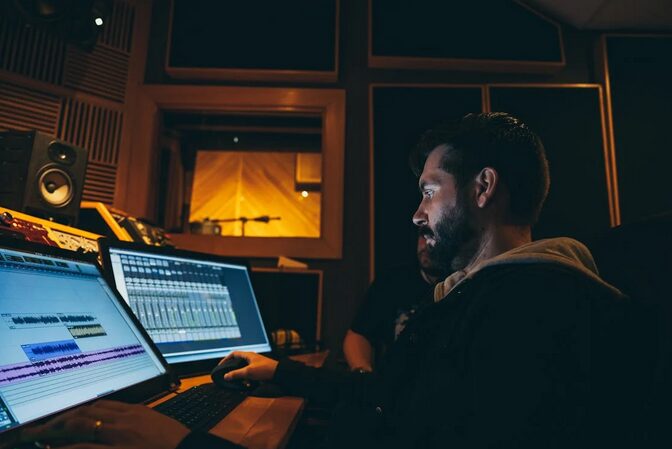Imagine walking into a music studio where the walls hum with creativity, but the musicians are nowhere in sight—replaced by algorithms and artificial intelligence. Welcome to the future of music production, where cutting-edge technology is not just an assistant but a collaborator, transforming how we create and experience sound. In this brave new world, automation transcends mere convenience; it opens doors to sonic possibilities previously confined to our wildest dreams. Whether you’re an aspiring artist, a seasoned producer, or simply a lover of melodies, understanding this evolution is essential. Join us as we explore how AI-driven tools are reshaping the landscape of music production and why you can’t afford to ignore these changes if you want your sound to stand out in an increasingly crowded digital arena.
AI and Machine Learning
Artificial intelligence (AI) and machine learning are making waves in music production. The technologies from www.unison.audio, for instance, can analyze vast amounts of data to identify patterns, making them incredibly useful for everything from composing melodies to mastering tracks. AI-driven tools like Amper Music and AIVA are already helping producers generate music quickly and efficiently. Imagine having an AI assistant that can suggest chord progressions, generate beats, or even create entire tracks based on your input. As AI continues to evolve, it will become an indispensable tool in every producer’s arsenal.
Remote Collaboration
The COVID-19 pandemic has accelerated the shift towards remote work, and music production is no exception. With tools like Splice, Soundtrap, and even Zoom, producers and musicians can collaborate from anywhere in the world. This trend is here to stay, making it easier for artists to work together without being in the same physical space. Remote collaboration tools allow for seamless sharing of projects, real-time editing, and communication, breaking down geographical barriers and fostering global creativity.
Sustainability in Music Production
As awareness of environmental issues grows, the music industry is also becoming more conscious of its ecological footprint. From using eco-friendly materials for physical media to adopting digital distribution methods, sustainability is becoming a key consideration. Producers are looking for ways to minimize waste, such as using energy-efficient equipment and reducing the use of non-recyclable materials. This trend towards sustainability will continue to shape the future of music production, encouraging more eco-friendly practices across the industry.
Virtual Reality (VR) and Augmented Reality (AR)

VR and AR are not just for gaming and entertainment; they’re also revolutionizing music production. With VR, producers can create and manipulate sounds in a 3D space, offering a more immersive and intuitive way to make music. Imagine donning a VR headset and using virtual instruments to create tracks in a completely immersive environment. AR, on the other hand, can enhance live performances by overlaying digital elements in the real world. These technologies will offer new creative possibilities and transform how we interact with music.
Enhanced Music Creation Software
Music creation software is constantly evolving, offering producers more powerful tools and features. Digital audio workstations (DAWs) like Ableton Live, Logic Pro, and FL Studio are becoming more sophisticated, with enhanced capabilities for sound design, mixing, and mastering. These advancements make it easier for producers to experiment and push the boundaries of their creativity. Expect to see more intuitive interfaces, advanced automation, and integrated AI features that streamline the production process and unlock new creative potential.
Blockchain and Music Rights
Blockchain technology is set to revolutionize the way music rights are managed and distributed. By providing a decentralized and transparent platform, blockchain can ensure that artists receive fair compensation for their work. Smart contracts can automate royalty payments, making it easier for musicians to track and receive payments. This technology empowers artists by giving them more control over their music and ensuring that they are fairly compensated for their creations.
The future of music production is full of exciting possibilities. With AI and machine learning, VR and AR, remote collaboration, sustainability, enhanced music creation software, and blockchain technology, the industry is poised for significant transformation. These trends will not only make music production more efficient and innovative but also more accessible and fair for artists around the world. Whether you’re a producer, musician, or simply a music enthusiast, keeping an eye on these emerging trends will ensure you stay ahead in this ever-evolving field. The future of music production is bright, and we can’t wait to see where it takes us.…


 The Talking Drum, also known as Dundun, is a staple in Afrobeat music, renowned for its ability to mimic the intonations of human speech through varying pitches and tones. Its hourglass shape and leather heads allow the player to squeeze or release tension while striking the drum with a curved stick, producing a wide range of sounds. Traditionally used by West African griots to communicate messages across long distances, the Talking Drum carries cultural significance beyond its musical capabilities.
The Talking Drum, also known as Dundun, is a staple in Afrobeat music, renowned for its ability to mimic the intonations of human speech through varying pitches and tones. Its hourglass shape and leather heads allow the player to squeeze or release tension while striking the drum with a curved stick, producing a wide range of sounds. Traditionally used by West African griots to communicate messages across long distances, the Talking Drum carries cultural significance beyond its musical capabilities. The Balafon, a traditional West African instrument, is an essential component of Afrobeat music. Made of wooden bars resting on gourds, it produces vibrant and melodic tones when struck with mallets. Its unique sound adds depth and rhythm to Afrobeat compositions, creating an unmistakable groove that sets the genre apart from others. Musicians often incorporate the Balafon in their performances to infuse authenticity and cultural significance into their music.
The Balafon, a traditional West African instrument, is an essential component of Afrobeat music. Made of wooden bars resting on gourds, it produces vibrant and melodic tones when struck with mallets. Its unique sound adds depth and rhythm to Afrobeat compositions, creating an unmistakable groove that sets the genre apart from others. Musicians often incorporate the Balafon in their performances to infuse authenticity and cultural significance into their music.
 Watching a basketball game with your son is an excellent way to bond and have fun together. Whether it’s watching an NBA game on TV or attending a local high school game, basketball is a sport that can bring people together. On the other hand, some parents play tapes or tell stories to their kids about the 2005 games. It is known that many people were watching out for it as it was the twenty-third world university games. To make the experience even more engaging, try teaching your son about the strategies and rules of basketball during breaks in the action. You could also encourage friendly competition by rooting for different teams and making small bets on who will win.
Watching a basketball game with your son is an excellent way to bond and have fun together. Whether it’s watching an NBA game on TV or attending a local high school game, basketball is a sport that can bring people together. On the other hand, some parents play tapes or tell stories to their kids about the 2005 games. It is known that many people were watching out for it as it was the twenty-third world university games. To make the experience even more engaging, try teaching your son about the strategies and rules of basketball during breaks in the action. You could also encourage friendly competition by rooting for different teams and making small bets on who will win.


 High-stakes games are another critical ingredient for an exciting sports event. When the stakes are high, athletes are pressured to perform. Whether it’s a championship game or a do-or-die match, the moment’s intensity can bring out the best in athletes and make for a truly memorable event.
High-stakes games are another critical ingredient for an exciting sports event. When the stakes are high, athletes are pressured to perform. Whether it’s a championship game or a do-or-die match, the moment’s intensity can bring out the best in athletes and make for a truly memorable event. In conclusion, several key ingredients go into making a sports event fun and exciting. From passionate fans to close competition, high-stakes games, star power, and great storylines, each factor can contribute to an unforgettable experience. So, whether you’re a die-hard fan or just looking for a great time, remember these ingredients the next time you watch a sports event.…
In conclusion, several key ingredients go into making a sports event fun and exciting. From passionate fans to close competition, high-stakes games, star power, and great storylines, each factor can contribute to an unforgettable experience. So, whether you’re a die-hard fan or just looking for a great time, remember these ingredients the next time you watch a sports event.…

 The best way to prevent your airsoft gun from rusting is to get one that has a high-quality coating. Look for guns with an electroless nickel coating or another kind of plating which offers superior protection against corrosion and wear and tear. This type of coating will help your gun look good and last longer, so it’s definitely worth investing in if you want your airsoft gun to look great for years to come. When it comes to choosing a gun, make sure you do your research and pick one with the best coating available.
The best way to prevent your airsoft gun from rusting is to get one that has a high-quality coating. Look for guns with an electroless nickel coating or another kind of plating which offers superior protection against corrosion and wear and tear. This type of coating will help your gun look good and last longer, so it’s definitely worth investing in if you want your airsoft gun to look great for years to come. When it comes to choosing a gun, make sure you do your research and pick one with the best coating available.
 One way to get free items during the holiday season is to participate in advent calendar competitions. Many companies offer these competitions as a way to promote their products or services. To find out about these competitions, you can check the websites of your favorite companies or search for “advent calendar competition” on Google. It is known that viele Online Adventskalender are made during this time of the year. In fact, there is a list of companies that are offering this type of competition. You can find this list here. Some of the prizes that you can win from these competitions include gift cards, free products, and even trips.
One way to get free items during the holiday season is to participate in advent calendar competitions. Many companies offer these competitions as a way to promote their products or services. To find out about these competitions, you can check the websites of your favorite companies or search for “advent calendar competition” on Google. It is known that viele Online Adventskalender are made during this time of the year. In fact, there is a list of companies that are offering this type of competition. You can find this list here. Some of the prizes that you can win from these competitions include gift cards, free products, and even trips. The last way to get free items during the holiday season is to attend holiday events. Many businesses and organizations host holiday-themed events, and many of them give away freebies to attendees. To find out about these events, you can check your local newspaper or search for “holiday events” on Google. Many people are looking forward to the holiday season, and there are plenty of ways to get free stuff. Some even check ahead to find out what their favorite companies are giving away. Whatever method you choose, make sure you have fun and enjoy the free items that you receive.
The last way to get free items during the holiday season is to attend holiday events. Many businesses and organizations host holiday-themed events, and many of them give away freebies to attendees. To find out about these events, you can check your local newspaper or search for “holiday events” on Google. Many people are looking forward to the holiday season, and there are plenty of ways to get free stuff. Some even check ahead to find out what their favorite companies are giving away. Whatever method you choose, make sure you have fun and enjoy the free items that you receive.

 Laser tag is another great outdoor game for boys. It is similar to capturing the flag, but teams try to capture each other’s “bases instead of flags.” This is a great game for active kids because it requires a lot of running and hiding. It is also a lot of fun and can be quite competitive. If you don’t have a laser tag set, you can easily make your own with some inexpensive materials from your local hardware store. Some even only use Nerf guns.
Laser tag is another great outdoor game for boys. It is similar to capturing the flag, but teams try to capture each other’s “bases instead of flags.” This is a great game for active kids because it requires a lot of running and hiding. It is also a lot of fun and can be quite competitive. If you don’t have a laser tag set, you can easily make your own with some inexpensive materials from your local hardware store. Some even only use Nerf guns.
 After a long day at work, it can be challenging to relax. We may be stressed out from our jobs or worried about other things in our lives. Listening to music can help us forget about our troubles and relax. The right type of music can help slow our heart rate and breathing, and it can even lower our blood pressure. It makes music a great way to unwind after a long day.
After a long day at work, it can be challenging to relax. We may be stressed out from our jobs or worried about other things in our lives. Listening to music can help us forget about our troubles and relax. The right type of music can help slow our heart rate and breathing, and it can even lower our blood pressure. It makes music a great way to unwind after a long day. Listening to music is a great way to bond with other people. Whether you’re sharing your favorite songs with a friend or going to a concert together, music can help us connect with others. And research has shown that listening to music together can increase feelings of closeness and social connectedness. These are just a few of the reasons music is so popular. Whether it’s helping us relax, improving our mood, or enhancing our exercise, there are many benefits to listening to music.…
Listening to music is a great way to bond with other people. Whether you’re sharing your favorite songs with a friend or going to a concert together, music can help us connect with others. And research has shown that listening to music together can increase feelings of closeness and social connectedness. These are just a few of the reasons music is so popular. Whether it’s helping us relax, improving our mood, or enhancing our exercise, there are many benefits to listening to music.…
 One of the best parts about climbing mountains is that you get to see places that few people ever get to see. When you climb to the top of a mountain, you are rewarded with stunning views that you can’t find anywhere else. Not to mention, the feeling of accomplishment you get from reaching the summit is unbeatable. Climbing mountains is also a great way to connect with nature.
One of the best parts about climbing mountains is that you get to see places that few people ever get to see. When you climb to the top of a mountain, you are rewarded with stunning views that you can’t find anywhere else. Not to mention, the feeling of accomplishment you get from reaching the summit is unbeatable. Climbing mountains is also a great way to connect with nature. Another great thing about climbing mountains is that it will teach you to enjoy small luxuries. There are no comforts or conveniences when you’re out in the wilderness. This can be a good thing, as it forces you to appreciate the small things in life. After a long day of hiking, a cold beer or a hot shower will taste better.
Another great thing about climbing mountains is that it will teach you to enjoy small luxuries. There are no comforts or conveniences when you’re out in the wilderness. This can be a good thing, as it forces you to appreciate the small things in life. After a long day of hiking, a cold beer or a hot shower will taste better.
 One way to select a good movie to watch is to consider its genre. If you’re in the mood for a horror movie, for example, you can browse through lists of horror movies until you find one that looks interesting. This approach can be helpful when you’re not sure what kind of movie you want to see.
One way to select a good movie to watch is to consider its genre. If you’re in the mood for a horror movie, for example, you can browse through lists of horror movies until you find one that looks interesting. This approach can be helpful when you’re not sure what kind of movie you want to see. Another thing to consider when selecting a movie is its audience rating. Many websites have user-generated ratings for film. These ratings can help gauge how good a movie is likely to be. However, it’s important to note that not all movies have ratings on these websites. In addition, not all ratings are accurate. So, while it’s helpful to consider audience ratings, could you not rely on them entirely? So, how do you select a good movie to watch?
Another thing to consider when selecting a movie is its audience rating. Many websites have user-generated ratings for film. These ratings can help gauge how good a movie is likely to be. However, it’s important to note that not all movies have ratings on these websites. In addition, not all ratings are accurate. So, while it’s helpful to consider audience ratings, could you not rely on them entirely? So, how do you select a good movie to watch?


 One final consideration for your electro-acoustic guitar setup, especially if you play in an open venue or record live, is the class of microphone you use. Microphones will reflect the sound produced by the guitar. That’s why you must get a crystal clear sound from your guitar. Another point is the mixing system that can amplify the sound produced by the amp or PA system. This ensures that the product is balanced and the calibre of the audio is there.
One final consideration for your electro-acoustic guitar setup, especially if you play in an open venue or record live, is the class of microphone you use. Microphones will reflect the sound produced by the guitar. That’s why you must get a crystal clear sound from your guitar. Another point is the mixing system that can amplify the sound produced by the amp or PA system. This ensures that the product is balanced and the calibre of the audio is there. Pickups are an essential requirement for any guitar. They are responsible for converting the electricity from the strings into sound vibrations and creating the music. The vibrations are transmitted to an output signal source and then to an amplifier or even a sound system. Thus, although the guitar produces the sound, the quality of the music produced by the output also plays a part in creating the sound. The pickup is installed from the bridge, and the controls are on the side or edge of the body panels. An acoustic-electric guitar contains controls for tone, volume, EQ and saturation.
Pickups are an essential requirement for any guitar. They are responsible for converting the electricity from the strings into sound vibrations and creating the music. The vibrations are transmitted to an output signal source and then to an amplifier or even a sound system. Thus, although the guitar produces the sound, the quality of the music produced by the output also plays a part in creating the sound. The pickup is installed from the bridge, and the controls are on the side or edge of the body panels. An acoustic-electric guitar contains controls for tone, volume, EQ and saturation.






 It is pointless to take lessons about something that you are not passionate about. It will be a complete waste of time. At the end of the day, it will feel as though you have lost track of life. Once you discover that you are interested in singing, it’s time to take it to the next level.
It is pointless to take lessons about something that you are not passionate about. It will be a complete waste of time. At the end of the day, it will feel as though you have lost track of life. Once you discover that you are interested in singing, it’s time to take it to the next level. We are living in the times when client reviews are doing much more than we ever expected. Imagine having to try something out without really knowing what awaits you. You’d have to be a risk taker for that to be possible. Client reviews have a way of preparing you for what’s ahead of you so you won’t be taken by surprise.
We are living in the times when client reviews are doing much more than we ever expected. Imagine having to try something out without really knowing what awaits you. You’d have to be a risk taker for that to be possible. Client reviews have a way of preparing you for what’s ahead of you so you won’t be taken by surprise.





 As you learn how to shoot in the wild, you will need someone to guide you on how to change from a particular position to another until you hit your target. During your training, they will always show you what to do with practical examples. A professional is someone who apart from being talented is well trained and skilled in shooting while at the firm or the wild. You will seek a professional’s help because you may want to take their footsteps or because you want to emulate their skills in wild game and birds shooting.
As you learn how to shoot in the wild, you will need someone to guide you on how to change from a particular position to another until you hit your target. During your training, they will always show you what to do with practical examples. A professional is someone who apart from being talented is well trained and skilled in shooting while at the firm or the wild. You will seek a professional’s help because you may want to take their footsteps or because you want to emulate their skills in wild game and birds shooting.
 As soon as you step in the concert venue, the energy in the house is palpable to anyone in. Everybody is there for the one reason and being with others around him or her who share the same interest in the auditions. Remember being in a place that you expect both invigorating and amazing performance draw up your attention and release your from day to day working or personal stress and struggle.
As soon as you step in the concert venue, the energy in the house is palpable to anyone in. Everybody is there for the one reason and being with others around him or her who share the same interest in the auditions. Remember being in a place that you expect both invigorating and amazing performance draw up your attention and release your from day to day working or personal stress and struggle. To achieve a healthy and robust body, experts say, you must keep yourself happy and remove and drain all stress sources at all cost. Therefore, you must identify the source that introduces happiness to you and one of the recommended points to be the live acting concert.
To achieve a healthy and robust body, experts say, you must keep yourself happy and remove and drain all stress sources at all cost. Therefore, you must identify the source that introduces happiness to you and one of the recommended points to be the live acting concert.
 Having fun together as a family helps you draw closer to each other. It improves the first support network between the members of the family and strengthening such bonds executes the feeling of belonging and security. Everyone gets emotionally connected to each other hence making fewer quarrels and fewer misunderstandings.
Having fun together as a family helps you draw closer to each other. It improves the first support network between the members of the family and strengthening such bonds executes the feeling of belonging and security. Everyone gets emotionally connected to each other hence making fewer quarrels and fewer misunderstandings. When parents and children spend time on having fun together, it helps the children learn some of the parenting skills, and also the parents learn some new ways of doing parenting better. These parenting skills instilled in your children will, of course, help them when they too become parents meaning they will give the best to their generation.
When parents and children spend time on having fun together, it helps the children learn some of the parenting skills, and also the parents learn some new ways of doing parenting better. These parenting skills instilled in your children will, of course, help them when they too become parents meaning they will give the best to their generation.